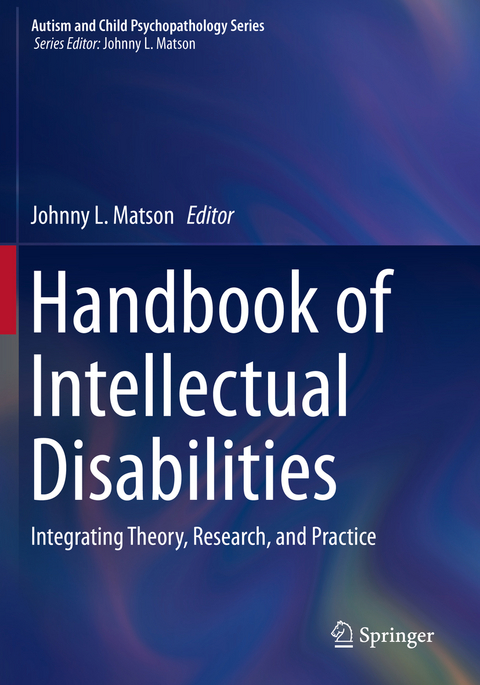
Handbook of Intellectual Disabilities
Springer International Publishing (Verlag)
978-3-030-20845-5 (ISBN)
Topics featured in this handbook include:
- Informed consent and the enablement of persons with ID.
- The responsible use of restraint and seclusion as a protective measure.
- Vocational training and job preparation programs that assist individuals with ID.
- Psychological and educational approaches to the treatment of aggression and tantrums.
- Emerging technologies that support learning for students with ID.
- Key sexuality and relationship issues that are faced by individuals with ID.
- Effective approaches to weight management for individuals with intellectual and developmental disabilities.
lt;b>Johnny L. Matson, Ph.D., is Professor and Distinguished Research Master in the Department of Psychology at Louisiana State University, Baton Rouge, LA, U.S.A. He has also previously held a professorship in psychiatry and clinical psychology at the University of Pittsburgh. He is the author of more than 800 publications including 41 books. He served as the Founding Editor-in-Chief for the journals Research in Developmental Disabilities (Elsevier) and Research in Autism Spectrum Disorders (Elsevier) and currently serves as the Editor-in-Chief for the Review Journal of Autism and Developmental Disorders (Springer).
Section 1. Foundations.- Chapter 1. History of Intellectual Disabilities.- Chapter 2. Theories of Intelligence.- Chapter 3. Definition and Diagnosis.- Chapter 4. Problem Solving and Working Memory in People with Intellectual Disabilities: An Historical Perspective.- Section 2. Philosophy of Care.- Chapter 5. Philosophy of Care.- Chapter 6. Quality of Life.- Chapter 7. Service Delivery Models.- Chapter 8. Comorbidity and Intellectual Disability.- Section 3. Parent/Professional Issues.- Chapter 9. Parent and Professional Organizations.- Chapter 10. Staff Training and Supervision.- Chapter 11. Multidisciplinary Teams.- Chapter 12. Reports and How to Write Them.- Chapter 13. Agencies and Professions in the Provision of Care.- Section 4. Client Protections and Innovations.- Chapter 14. Informed Consent.- Chapter 15. Research Priorities and Protection.- Chapter 16. Restraint and Seclusion.- Chapter 17. Monitoring Drug Side-effects.- Section 5. Causes and Risk Factors of Intellectual Disabilities.- Chapter 18. The Effects of Genetic Disorders on Language.- Chapter 19. Social and Psychological Stressors.- Chapter 20. Environmental Chemical Exposures and Intellectual Disability in Children.- Section 6. Assessment.- Chapter 21. The Role of Intelligence Tests in the Assessment of Intellectual Disabilities.- Chapter 22. Early Assessment and Tests for Adaptive Behavior.- Chapter 23. Tests for Dual Diagnosis.- Chapter 24. Assessing Challenging Behaviors.- Chapter 25. Vocational Skills and their Assessment.- Chapter 26. Neuropsychology.- Section 7. General Issues in Treatment.- Chapter 27. Evidence Based Treatment.- Chapter 28. Pseudoscientific Therapies for Autism Spectrum Disorder.- Chapter 29. Care Giver Treatment Choices.- Section 8. Treatment ofProblem Behaviors.- Chapter 30. Behavioral Strategies to Address Noncompliance.- Chapter 31. Stereotypy and Repetitive Behaviors.- Chapter 32. Self-Injurious Behavior.- Chapter 33. Pica.- Chapter 34. Feeding Disorders.- Chapter 35. Psychological and Educational Approaches to the Treatment of Aggression and Tantrums in People with Intellectual Disabilities.- Chapter 36. Use of Medications in the Treatment of Aggressive Behavior.- Section 9. Skill Building and Intellectual Disabilities.- Chapter 37. Social Skills.- Chapter 38. Coping Skills Training in Individuals with Intellectual Disability.- Chapter 39. Early Intervention.- Chapter 40. Parenting Support .- Chapter 41. Self-Help Skills.- Chapter 42. Curriculums.- Chapter 43. Emerging Technology for Students with Intellectual Disability.- Section 10. Treatment for Dual Diagnosis.- Chapter 44. Anxiety and Phobias.- Chapter 45. Depression.- Chapter 46. Psychosis.- Chapter 47. Evidence-Based Treatments for Comorbid Autism Spectrum Disorders.- Chapter 48. Attention-Deficit/Hyperactivity Disorder (ADHD).- Chapter 49. Developmental Coordination Disorder.- Chapter 50. Substance Use Disorders.- Chapter 51. Dementia and Intellectual Disability: Prevalence, Assessment and Post-Diagnostic Support.- Section 11. Health and Social Behaviors.- Chapter 52. Issues of Sexuality and Relationships.- Chapter 53. Pain.- Chapter 54. Nutrition.- Chapter 55. Diabetes.- Chapter 56. Factors in Weight Management: A Research Story.- Chapter 57. Incontinence.
| Erscheinungsdatum | 22.09.2020 |
|---|---|
| Reihe/Serie | Autism and Child Psychopathology Series |
| Zusatzinfo | XXI, 1133 p. 62 illus., 27 illus. in color. |
| Verlagsort | Cham |
| Sprache | englisch |
| Maße | 178 x 254 mm |
| Gewicht | 2120 g |
| Themenwelt | Geisteswissenschaften ► Psychologie ► Entwicklungspsychologie |
| Geisteswissenschaften ► Psychologie ► Pädagogische Psychologie | |
| Medizin / Pharmazie ► Medizinische Fachgebiete ► Pädiatrie | |
| Medizin / Pharmazie ► Medizinische Fachgebiete ► Psychiatrie / Psychotherapie | |
| Sozialwissenschaften ► Pädagogik ► Sozialpädagogik | |
| Schlagworte | Aggression and intellectual disability • Assessment and treatment of intellectual disabilities • Autism spectrum disorder (ASD) and ID • Comorbidities and intellectual disorders • Compliance and ID • Down Syndrome and intellectual disability • Dual diagnosis and intellectual disabilities • Environmental toxins and ID • Epilepsy, seizures, and intellectual disabilities • Feeding and intellectual disabilities • Functional assessment of intellectual disabilities • Genetics and intellectual disability • Informed consent and intellectual disability • Intellectual disabilities and pica • Legal issues and intellectual disability • Report writing and intellectual disabilities • Restraint, seclusion and intellectual disability • Self-injurious behavior (SIB) and intellectual disorders • Substance abuse and intellectual disabilities • Vocational training and ID |
| ISBN-10 | 3-030-20845-1 / 3030208451 |
| ISBN-13 | 978-3-030-20845-5 / 9783030208455 |
| Zustand | Neuware |
| Haben Sie eine Frage zum Produkt? |
aus dem Bereich


